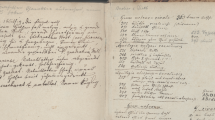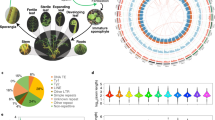Abstract
July 2022 will see the bicentenary of the birth of Gregor Mendel, often hailed as the ‘father of modern genetics’. To mark the occasion, I retrace Mendel’s origins, revisit his famous study ‘Experiments in plant hybridization’, and reflect on the revolutionary implications of his work and scientific legacy that continues to shape modern biomedicine to this day.
This is a preview of subscription content, access via your institution
Access options
Access Nature and 54 other Nature Portfolio journals
Get Nature+, our best-value online-access subscription
$29.99 / 30 days
cancel any time
Subscribe to this journal
Receive 12 print issues and online access
$189.00 per year
only $15.75 per issue
Buy this article
- Purchase on Springer Link
- Instant access to full article PDF
Prices may be subject to local taxes which are calculated during checkout
Similar content being viewed by others
References
Bentley, D. R. et al. Accurate whole human genome sequencing using reversible terminator chemistry. Nature 456, 53–59 (2008).
Smith, G. D. & Ebrahim, S. ‘Mendelian randomization’: can genetic epidemiology contribute to understanding environmental determinants of disease? Int. J. Epidemiol. 32, 1–22 (2003).
Liu, Y. et al. Expanded diversity of Asgard archaea and their relationships with eukaryotes. Nature 593, 553–557 (2021).
Jinek, M. et al. A programmable dual-RNA-guided DNA endonuclease in adaptive bacterial immunity. Science 337, 816–821 (2012).
Maxwell, J. C. A dynamical theory of the electromagnetic field. Philos. Soc. R. Soc. Lond. 155, 459–512 (1865).
Abbott, S. & Fairbanks, D. J. Experiments on plant hybrids by Gregor Mendel. Genetics 204, 407–422 (2016).
Mendel, G. Versuche ueber planzenhybriden Verh. Nat. Ver. Bruenn 4, 3–44 (1866).
Flemming, W. Beiträge zur Kenntnisse der Zelle und ihrer Lebenserscheinungen. Arch. Mikrosk. Anat. 16, 302–436 (1879).
Boveri, T. Ueber mehrpolige mitosen als mittel zur analyse des zellkerns. Verh. Phys. Med. Gesellsch. Wuerzburg 35, 67–90 (1902).
Beneden, E. V. Researches sur la maturation de l’oeuf et la fecondation. Arch. Biol. Paris 4, 265–638 (1883).
Sutton, W. S. The chromosomes in heredity. Biol. Bull. 4, 231–251 (1903).
Darwin, C. R. & Wallace, A. R. On the tendency of species to form varieties; and on the perpetuation of varieties and species by natural means of selection. Zool. J. Linn. Soc. 3, 45–62 (1858).
Kimura, M. The Neutral Theory of Molecular Evolution. (Cambridge University Press, 1983).
Mawer, S. Gregor Mendel Planting the Seeds of Genetics (Abrams, 2006).
Gliboff, S. Evolution, revolution, and reform in Vienna: Franz Unger’s ideas on descent and their post-1848 reception. J. Hist. Biol. 31, 179–209 (1998).
Darwin, C. On the Origin of Species by Means of Natural Selection (John Murray, 1859).
Malthus, T. R. An Essay on the Principle of Population (J. Johnson, 1798).
Popper, K. Objective Knowledge: An Evolutionary Approach (Clarendon, 1972).
Charlesworth, B. & Charlesworth, D. Darwin and genetics. Genetics 183, 757–766 (2009).
Naegili, C. W. Mechanisch-Physiologische Theorie der Abstammunglehre (Max Planck Institute for the History of Science, 1884).
Fairbanks, D. J. Mendel and Darwin: untangling a persistent enigma. Heredity 124, 263–273 (2020).
Darwin, C. R. The Variations of Animals and Plants Under Domestication (John Murray, 1868).
Iltis, H. Gregor Mendel and his work. Sci. Monthly 56, 414–423 (1943).
Fisher, R. A. Has Mendel’s work been re-discovered? Ann. Sci. 1, 115–137 (1936).
Beadle, G. W. & Tatum, E. L. Genetic control of biochemical reactions in neurospora. Proc. Natl Acad. Sci. USA 27, 499–506 (1941).
Crick, F. H. in Symposia of Society for Experimental Biology (Cambridge University Press, 1958).
Sturtevant, A. H. The linear arrangement of six sex-linked factors in Drosophila, as shown by their mode of association. J. Exp. Biol. 14, 43–59 (1913).
van Dijk, P. J. & Ellis, T. H. The full breadth of Mendel’s genetics. Genetics 204, 1327–1336 (2016).
Watson, J. D. & Crick, F. H. C. A structure for deoxyribonucleic acid. Nature 171, 737–738 (1953).
Jacob, F. The Statue Within (Basic Books, 1988).
Acknowledgements
The author thanks B. Charlesworth and M. Srinivasan for helpful comments on the manuscript.
Author information
Authors and Affiliations
Corresponding author
Ethics declarations
Competing interests
The author declares no competing interests.
Additional information
Publisher’s note
Springer Nature remains neutral with regard to jurisdictional claims in published maps and institutional affiliations.
Rights and permissions
About this article
Cite this article
Nasmyth, K. The magic and meaning of Mendel’s miracle. Nat Rev Genet 23, 447–452 (2022). https://doi.org/10.1038/s41576-022-00497-2
Accepted:
Published:
Issue Date:
DOI: https://doi.org/10.1038/s41576-022-00497-2
This article is cited by
-
From Mendel to multi-omics: shifting paradigms
European Journal of Human Genetics (2023)
-
The true legacy of Gregor Mendel: careful, rigorous and humble science
Nature (2022)
-
Thoughts on a legacy
Nature Reviews Genetics (2022)



